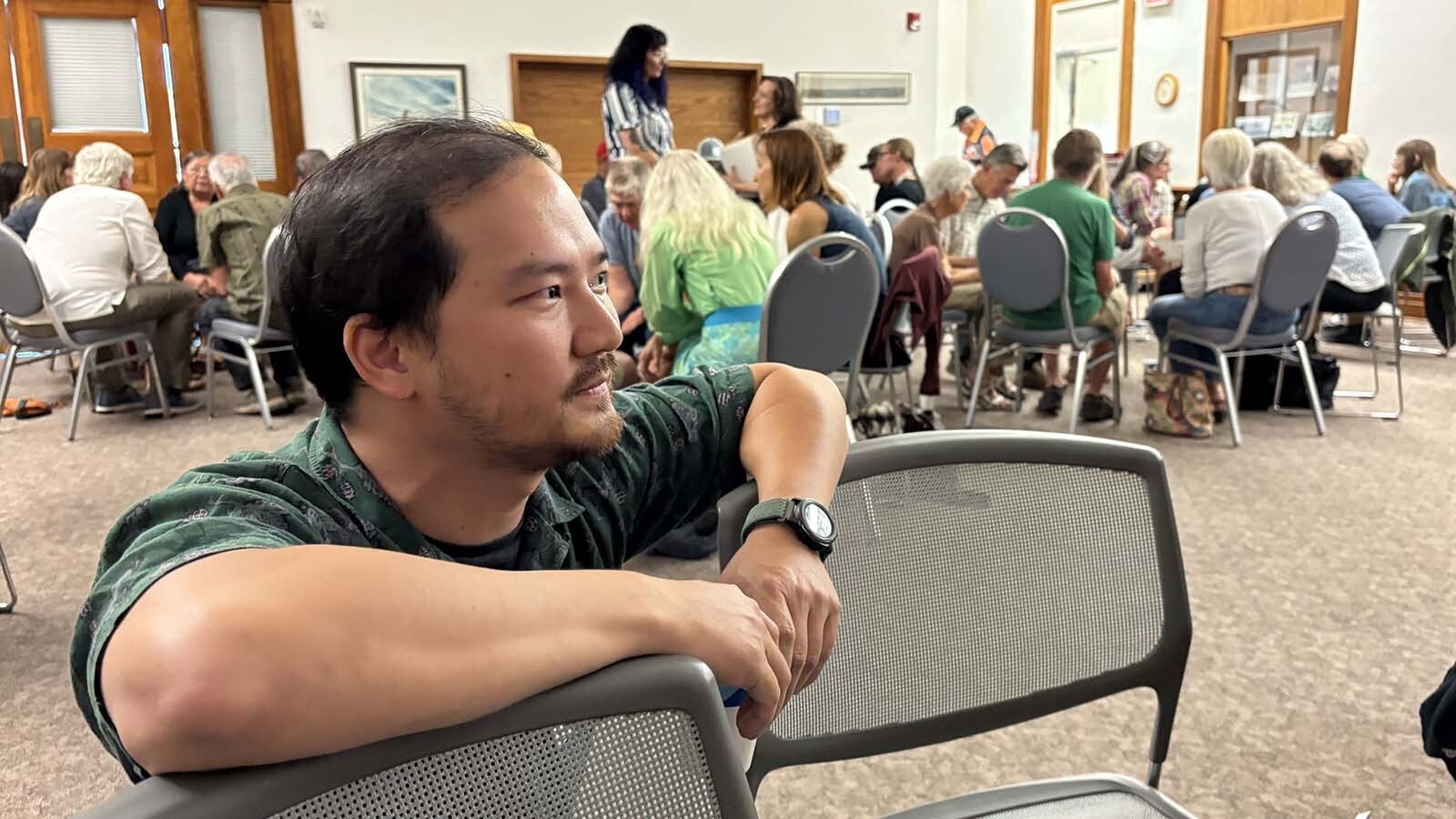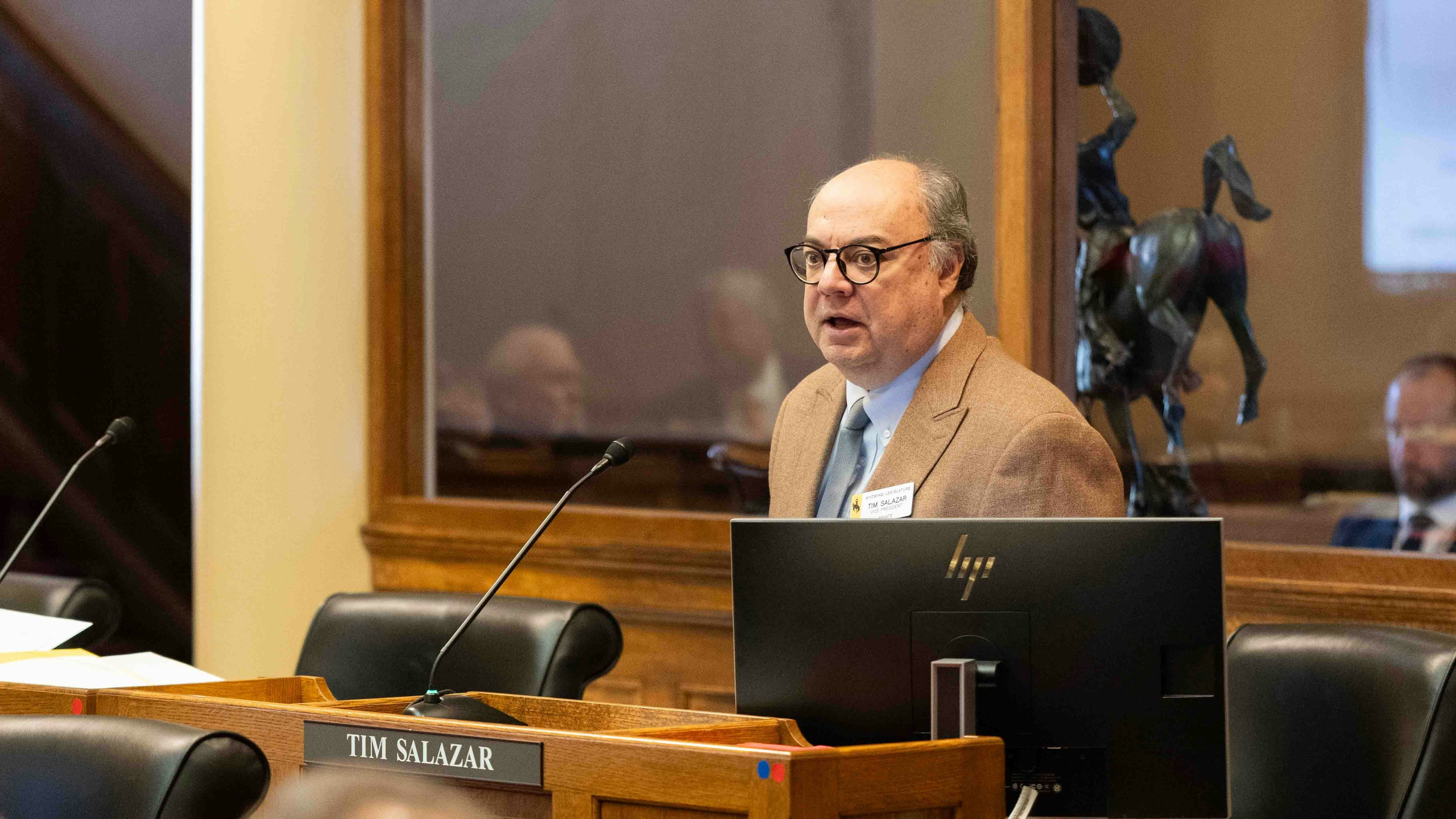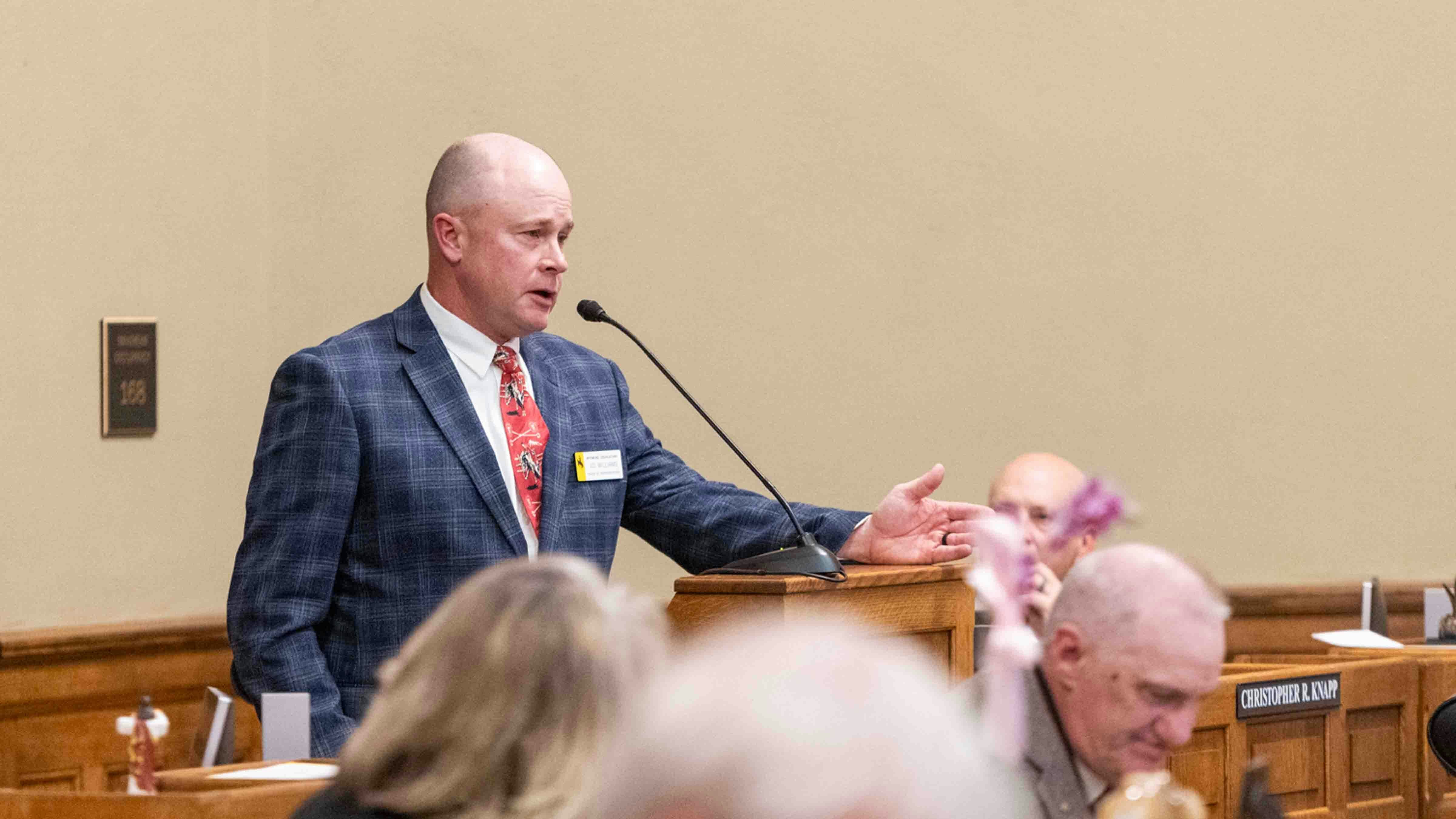For one week in June, hundreds of Wyomingites across the political spectrum galvanized under the leadership of a purple-haired, outspoken, female Ph.D. from Laramie.
Whether it was fate or a broken-clock moment that made Rep. Karlee Provenza, D-Laramie, the face of the Wyoming resistance to a proposed public lands selloff mandate doesn’t matter — at least to her.
“I would die for my public lands. I love them,” Provenza told Cowboy State Daily on Thursday. “I fight for what I believe in.”
Ultimately Republican U.S. Sen. Mike Lee’s proposed sell-off mandate was scrapped — after attracting backlash across the American West.
Provenza for her part wrote an op-ed, gave interviews, organized a rally and sent the protest letters of 500 people to Congressional delegates.
Her fight happened to match the uproar from across Wyoming.
“I heard from so many people that they were concerned — and I didn’t see anybody standing up to make sure we had a unified voice for people who enjoy and respect our public lands,” she said.
Last week, Provenza and Rep. Mike Yin, D-Jackson, stepped outside their own districts in search of more outrages to shoulder. They were also looking to revive interest in the Democratic Party, which has struggled to maintain a voice at the Capitol amid a growing GOP majority.
Or as Provenza put it, “we are bringing more Wyoming problems and Wyoming solutions to the legislature.”
The “listening-session” meetings started in Cheyenne earlier this month. Then Provenza and Yin went to Casper on Tuesday and Lander on Thursday. They are planning at least seven more stops in seven more towns for the coming weeks, Provenza said.
As usual for Wyoming democrats, they’ll have to punch above their weight if they hope to make big changes.
The Wyoming Legislature is 91.4% percent Republican. All five statewide elected officials are Republicans.
The GOP holds the White House and both chambers of the U.S. Congress.

Nobody’s Heckling
As of Thursday, no hecklers had emerged.
That’s because of how the listening sessions are arranged, said Provenza:
The attendees don’t sit in rows facing a politician, but in tight clusters with one another.
Thursday’s session started at 5:30 p.m. in an upper room of the Lander Library — under an enormous crystal chandelier. Attendees settled into about a dozen different chair-circle clusters, each containing roughly eight, tightly-angled chairs.
Yin and Provenza delivered collective writing prompts to the groups like, “What keeps you up at night?”
There was no need to give the subtext: which was, “what political happenings in Wyoming keep you up at night?” The crowd was already charged – often speaking from the political Left.
Rep. Ivan Posey, D-Fort Washakie, sat near the front of the room near Sergio Maldonado, a Democrat who ran unsuccessfully in 2022 for the office of Wyoming Superintendent of Public Instruction.
Known conservatives were in attendance too, comprising 5-10% of the 80-or-so people there. Public figures among those were state Rep. Lloyd Larsen, R-Lander, and former state Rep. Sarah Penn, R-Fort Washakie.
Up At Night
Lander man Rod Haper stays awake at night thinking about funding cuts for local services like ambulance, he told his circle. He criticized Wyoming lawmakers’ indications that they’re pursuing more property tax cuts than they’ve already passed.
“If they cut that, I don’t see how we’re gonna maintain,” said Haper.
John Gans echoed that, adding that property tax cuts hit smaller communities hard.
“And I would put Lander in that category,” he said.
Gans acknowledged to Cowboy State Daily that he’s now known as “Mara’s dad” around Lander, since his daughter Mara Gans won a seat on the Fremont County School District No. 1 board in the last election.
The closure of the Lander-based St. John’s Health satellite clinic weighs heavily on Shana White. She fears more health care clinic closures, she said.
Alicia Palazzolo said she’s haunted by the Wyoming legislature’s recent repeal of most gun-free zones,
“We just got through getting kids settled into school today. Walking in, I’m wanting to know who’s carrying guns — who has training,” said Palazzolo. “There’s such a political influence on our schools.”
Palazzolo also criticized a drug-testing mandate for student athletes that the local school board passed two years ago, saying it’s a waste of money.
White referenced Wyoming law that passed in 2024, requiring public-school personnel to alert parents to health and other changes in a child’s life. That has trickled all the way down to the minutiae, Palazzolo said.
Across the room in another circle, attendees voiced fears about wildfires, pollution, voter access, and public-school funding.
A man named John cast the temporary closure this month of eight local newspapers as a dark portent.
Group Reports
Yin called for everyone to stop talking, and for each circle’s designated scribe to deliver a group report on what causes political insomnia.
Health care, public lands access, voter access and public-school funding were repeat themes across the groups.
One group scribe, Avila Rae Friday, called for an increase to the minimum wage. Friday voiced concerns about poor water infrastructure on the reservation, which has been a source of issues in the past.
She said the state doesn’t accept tribal ID cards for voter registration.
A corrective murmur rippled across the room.
“They do accept tribal ID,” whispered Haper to Gans.
“Correct,” Gans whispered back.
A new state voter identification law enacted this year requires proof of U.S. citizenship and Wyoming residency when registering to vote. It also requires county clerks to accept tribal ID cards as registration documents.
War Path
When one scribe went on the war path, Yin intervened.
“We have useless county commissioners,” said the scribe. “We have useless, idiot Freedom Caucus – “
Some attendees chuckled.
“Hey, hey —“ interrupted Yin. “We’re not gonna target people. We’re trying to target policies.”
The Wyoming Freedom Caucus is a group of Republican lawmakers who often legislate social issues.
The scribe pivoted to “women’s reproductive rights,” a reference to abortion access.
Wyoming has passed multiple laws to ban or restrict abortion, but those are paused by court order, while the Wyoming Supreme Court contemplates whether abortion is a health care right protected under the state Constitution’s promise of health care autonomy.
Clannish Though
Yin gave the next prompt: “Imagine a headline you want to see in one to five years – of the Wyoming that you want.”
White and Palazzolo discussed what they called a need for family-friendly policies, especially the kind that would honor the multi-generational presence in many homes across the reservation.
Gans agreed, emphasizing “the strength of the family.”
“The problem with that philosophy,” countered Haper, “You say it’s ‘family,’ which is clannish. Families, they’re a unit. So they don’t always get along with other units.”
Gans nodded. “We’ve politicized what a family is. Because we know there’s some people, politically, they hear ‘family’… they think some families count and some don’t.”
“We need to define what we’re going to call a family,” said Haper.
But the writing window expired before the circle could define “family.”
Basic Universal Income … In Wyoming
Sarah Reilley, the organizer behind grassroots group Advocates for Lander Students, delivered a group report of fairy-tale-caliber (or dystopian, depending on whom you ask) Wyoming headlines.
“Wyoming Saves Trillions Of Dollars By Enacting Universal Basic Income,” Reilley read aloud from her group paper. She added, “Wyoming’s Universal Health Care System Adopted Nationwide.”
Applause erupted.
Another scribe read, “Ranked Choice Voting Approved In Wyoming.”
Wyoming, rather, just banned ranked choice voting all the way down to the town-election level.
One scribe elicited another bout of applause with the headline, “Women Take Over Legislature.”
Friday stood to read the headline, “Wyoming Says No To Nuclear Waste And Manufacturing,” while Larsen, a proponent of nuclear-friendly policies, looked on.
Some of the other headlines touted were more politically universal. Such as:
“Wyoming in The Top Five For Retaining Youth”
“Wyoming Lowest In National Suicide Rates”
“Lawmakers Work With Community Members.”
‘Why Should We Listen To Jackson?’
Though team-bonding with Wyoming, Yin found himself defending his hometown of Jackson.
“How many millionaires and billionaires live in Jackson?” asked a man. “Why should we listen to Jackson?”
Some attendees laughed.
Teton County, where the county seat is Jackson, is easily the wealthiest county in Wyoming and routinely ranks among the wealthiest in the nation.
Yin countered.
“So – so a lot of those people don’t live here,” he said. “The people who live full-time in Jackson are the tourism workers right? They’re people who make less money than I do. They make like 70-K, work three jobs, and share a two-bedroom apartment with five people.”
Teton County’s housing market is known for its exorbitance; its price-out exclusion of the working class.
“The people that are billionaires and millionaires, those are people who live there for three months out of the year; and I’ve tried to tax their second home,” said Yin, making a reference to Republican-enacted property tax cuts on Wyoming homes up to the first $1 million in value. “And for some reason other legislators don’t think we should tax their second home.”
Reach Out Further
Provenza told the room that she and Yin are compiling everyone’s answers with others from across the 10 counties they’re visiting, to share those with their colleagues and work on Wyoming issues in the legislature.
Then she floated an issue of her own.
“We’re seeing more and more people that are spending more time alone. We’re disconnected from our communities,” said Provenza. She urged people to host community dinners and spark “conversations across the aisle.”
“Regardless of what the government is doing, we need to be able to have conversations with our neighbors,” she said. “And we need to start reaching out further.”
Clarification - an earlier version of this story said White said the parental rights law had trickled down to the minutiae, when that comment came from Palazzolo.
Clair McFarland can be reached at clair@cowboystatedaily.com.





